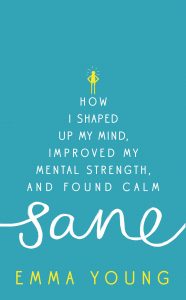How Stoicism is Helping to Strengthen My Mind
by Emma Young

I knew I had a problem when my work became about me. Researching a story on the upsides of anger for New Scientist magazine, I found myself taking the opportunity to quiz academic experts on topics that were relevant not to the piece, but to my own life. After agreeing to be interviewed for another assignment, an American psychologist who has found that ‘loving-kindness’meditation can improve relationships and boost psychological wellbeing found herself so enthusiastically interrogated, it came across as aggressive. (I winced repeatedly while transcribing the recording of our conversation).
The thing is, I didn’t actually have a problem with anger. And my relationships with my family and friends were pretty good. What I did have was a more general mental ‘weakness’, for want of a better word. I had the kind of mind that would lay awake night after night, worrying about past ‘mistakes’(why didn’t I buy that flat, why did I leave that job, why did I say that to my friend?). I made diet and exercise plans, and abandoned them. I felt stressed out, and irritable, which affected not only me but my husband and my two young boys.
And so, I decided to change. I had a degree in psychology and 20 years’experience as a science and health journalist, so I set out to find strategies that could build a stronger mind. I researched meditation, exercise, diet, military and sporting mental toughness interventions – and also self-talk. And when it came to what I tell myself – and the most useful guidance in how to think – I’ve found that I’m most drawn to Stoicism – and it’s made a real difference.
I contacted the Stoicism Today group, and interviewed a founder member, Donald Robertston, asking him what livingly Stoically means, and how to do it. I’d just spent a few months immersed in the positive psychology literature, and I found what he had to tell me incredibly refreshing. He told me how, in preparation for exams he was about to take, he’d envisage failing, to prepare himself for that genuine possibility. How different this seemed to the ‘go-me!’, positive take on life. And yet, when it comes to things we’d really like in life – to the toughest goals we set for ourselves – of course, failure is a genuine possibility. In fact, I’m sure it happens more often than wild success. That’s certainly been the case for me. Robertson’s approach seemed so much more rational, and less likely to lead to debilitating self-criticism, especially when coupled with the fact, as he explained, that a core Stoic value is that the only things we have real control over are our thoughts and our actions – and that exam success is only partly in our control, because it is also in the ‘hands of fate’.
But if I had clear guidance, now, not to worry about things that are outside my control – whether that’s bad traffic or an ambiguous comment from a friend – I realised I’d also shirked a big responsibility: to be in control of my own thoughts. It felt like a serious challenge. But because I could now slough off the weight of so many pointless and destructive thoughts, I felt I had the mental space to focus on this. Faced with a person seeking a confrontation, for example, I could tell myself: don’t worry about what they’re saying and what they’re thinking, worry about what you’re saying and how you’re behaving. And I do try to, and I do feel this really helps.
Donald Roberston stressed to me that living Stoically is not easy – that it does require constant vigilance and effort, but that effort lessens over time, just as a physical challenge gets easier the fitter you become. I’ve been surprised by how easily I’ve managed to stop myself being upset by anonymous challenges (like bad traffic, or a delayed flight). I find it harder to control my emotions and thoughts when faced with a person seemingly intent on disrupting them. But I know that every time I keep my temper and stay calm, I’m getting stronger. And it’s not just a theoretical improvement – I feel it, too.
See also the Elle review, June 2015: “Young won’t settle for any shoddy theories in her quest to develop a ‘comprehensive programme that could build basic mental strength’. She covers a lot of ground: meditation, exercise, diet, sleep, controlling negative thoughts, mental toughness and getting in touch with your senses. I tried out meditation because Young actually proves that it diminishes stress…Young says: ‘Getting upset about something outside your control is destructive. You can only control your emotions and your actions’. This is just what I needed to hear.”
The book is available to purchase here.
Emma Young is the author of Sane: How I shaped up my mind, improved my mental strength and found calm, published by Hodder & Stoughton. Emma has a degree in psychology from the University of Durham and 20 years’ experience as a science and health journalist on titles including the Guardian, the Sydney Morning Herald and New Scientist.




There isn’t much I can say about this except that I agree with Emma Young. I think the need to deal with what you can deal with and not fret over what you cannot, as advised by Epictetus, is essential to getting rid of stress. Emma, with children, may also realise as the years pass and her children become adults that it is essential to accept that trying to control other people’s lives can only lead to frustration and misery.